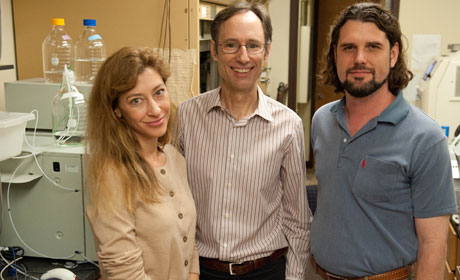A research team comprising Keith P. Johnston, Thomas M. Truskett and Jennifer Maynard from the Cockrell School of Engineering at The University of Texas at Austin has developed a novel protein formulation strategy to develop advanced drug delivery systems for treating arthritis, cancer and infectious diseases easily, efficiently and safely.
 From left to right: Assistant Professor Jennifer Maynard, Professor Keith P. Johnston and Professor Thomas Truskett.
From left to right: Assistant Professor Jennifer Maynard, Professor Keith P. Johnston and Professor Thomas Truskett.
The research team has developed a novel physical form of proteins wherein they are bundled into highly concentrated, nanoscale clusters, which can enter into a patient’s body via a needle to treat diseases. The densely clustered drug proteins avoid unfolding or the formation of hazardous aggregates, allowing the novel composition to eliminate the drawbacks of earlier attempts.
Way back in 2004, Truskett envisaged that protein-based medicines in a solution are stable when they have an ultra-high concentrated formulation. At that point, Johnston had concentrated stable protein nanoparticles but did not know the dispersion technique for injecting them.
In 2009, the team produced protein nanoclusters in water by adjusting the level of pH and incorporating sugar to cluster protein molecules. When these proteins were diluted or were subcutaneously injected into a mouse, they isolated into single stable molecules that have biological activity. Subsequent to its injection, the protein in the bloodstream hits targeted tumors and cells. In the same year, Brian Wilson, a chemical engineering senior, developed a transparent dispersion of ultra-high concentrated protein that was later determined to be made of nanoclusters.
The research team is working on creating a novel thermodynamic theory for optimizing the design of the nanoclusters. Three patent applications have been submitted via the Office of Technology Commercialization of The University of Texas at Austin since the commencement of the research in 2004.
Source: http://www.engr.utexas.edu